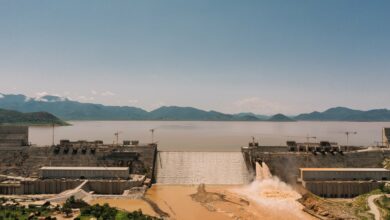Al-Masry Al-Youm has learned that Egypt and Uganda are considering convening an emergency summit to reexamine the Entebbe framework agreement on Nile water sharing signed by five upstream states. The summit, if held, would be attended by high level delegations, including heads of states, from the seven upstream states and the two downstream states, Egypt and Sudan.
Senior Egyptian officials said that President Hosni Mubarak sent a message to the President of Tanzania requesting his help in organizing the conference. In the message, Mubarak reportedly expressed his desire to enter into new negotiations with the other Nile states over water sharing in light of the failure of recent meetings at the Egyptian resort of Sharm el-Sheikh to resolve disputes over water sharing.
In related news, Egyptian Minister of Water Resources and Irrigation Mohamed Nasr el-Din Alam said that the government had decided to shut off the flow of Nile water into the Mediterranean Sea at two of its branches, Dumyiat and Rashid. Water exports said that such a move will conserve more than five billion cubic meters of water per year.
After finishing his tour of the Baheira Governorate Monday, Alam said that the government had plans to end water shortages, amid complaints that water was not arriving to the end of the irrigation canals. He noted that campaigns continued to remove fish cages from the Dumiyat and Rashid branches, stating that fish farming in fresh water was illegal in Egypt.
Regarding the depletion of underground water reservoirs in areas where land reclamation was in progress, Alam stated that his ministry had finalized legislation for the management of groundwater resources and sent it to the Council of Ministers, which would soon present it to the People’s Assembly for approval.
The minister said that the new legislation would prevent the use of groundwater to fill artificial lakes, limiting its use to crop irrigation. He added that tourist resorts that use the groundwater would be charged at drinking water prices, higher than the irrigation water prices they are currently charged.
According to Alam, the legislation would also impose taxes on wells dug on investment farms on reclaimed lands, with the goal of conserving water. He said that there are more than 38,000 illegal wells in Egypt, compared to only 20,000 licensed wells.
The minister added the government was currently conducting exploration work for additional underground reservoirs that could be used for irrigation purposes.
A technical memorandum prepared by the Groundwater Research Institute, a department of the Ministry of Water Resources and Irrigation, said that the negative ramifications of intensive development and use of groundwater were beginning to become apparent. It called attention to the phenomenon of declining groundwater, noting that in some regions such as Wadi el-Faragh and Dina Farms, water use had completely outstripped the capacity of underground reservoirs.
The memorandum stated that imprudent use of groundwater had also led to a decline in water quality, indicating that water salinity in some regions had exceeded 2000 parts per million. It said that the amount of groundwater taken from underground reservoirs in Egypt had increased to one billion cubic meters, compared to only 470 million cubic meters in 1990. According to the memorandum, approximately 250 new groundwater wells were being dug each year.
Translated from the Arabic Edition.




